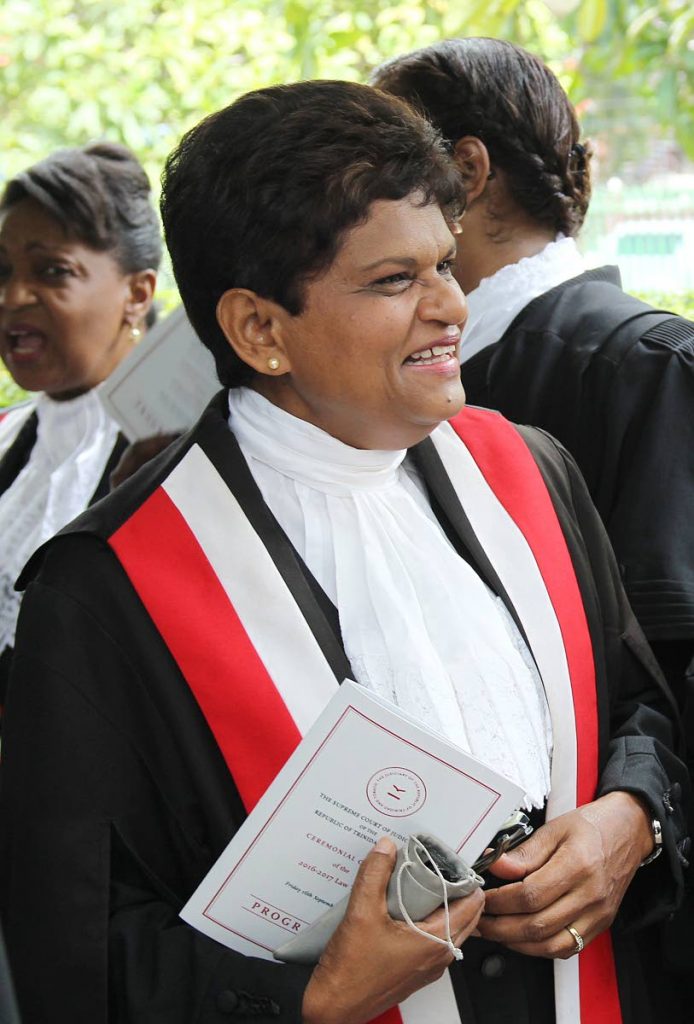Appeal Court reserves ruling on Samdaye Rampersad murder

THREE Court of Appeal judges have reserved their ruling in the appeal of the five men who were each sentenced to 28 years in prison for the 2005 killing of San Juan businesswoman Samdaye Rampersad.
At the end of submissions on Tuesday, Justices of Appeal Alice Yorke-Soo Hon, Prakash Moosai and Mark Mohammed reserved their ruling.
However, they have asked for additional submissions on the issue of a retrial.
Having already gone on trial three times – in the last they were convicted of manslaughter – the five have faulted Justice Norton Jack's handling of their third trial, which resulted, they say, in a miscarriage of justice and a perverse verdict of manslaughter by the jury.
The five – Phillip “The Boss” Boodram, Roger Mootoo, Ricky Singh, Kerwin Williams and Aaron “Arc Eye” Grappie – were not found guilty of the capital charge of murder, but guilty of the lesser count of manslaughter at the end of their trial in 2017.
It was their third trial, with one occurring in 2009 and the other in 2012. Both resulted in jurors not being able to arrive at unanimous verdicts. Their third began in September 2015 and ended in March 2017.
In their more than 13 grounds of appeal, attorneys for the five men pointed the judges to several misdirections and errors they said the judge made throughout the trial as well as in his directions to the jury.
“There was a series of misdirections,” British Queen’s Counsel Edward Fitzgerald argued, adding that the court cannot find that the jury got it right in their verdict because of the multiple misdirections by the judge. He said while there were five or six correct ones, there were some 13 misdirections and the judge’s route-to-verdict document, which the jury was allowed to use to guide its deliberations, also emphasised the judge’s errors.
Fitzgerald said ideally, the good sense of a jury can be trusted once it is properly directed. However, in this case, he said, the jury could not be trusted because of the misdirections.
“Each of our grounds are left unscathed by the State,” British QC Paul Taylor submitted.
Both Fitzgerald and Taylor, of Doughty Street Chambers in London, made their submissions via video link from London at the virtual hearing of the appeal.
Central to their complaints is the testimony of the State’s main witness, Nigel “Cat” Roderique. They have complained of the prosecution’s decision not to charge him along with the others although he was clearly an accomplice.
Rampersad was kidnapped from her home on November 27, 2005. She was severely beaten and then buried alive in a shallow grave in a cashew field in Claxton Bay.
On January 5, Roderique led police to her body in the hills between Diamond Village and Carolina Village, Claxton Bay. He gave a statement to police in which he implicated all five in either the planning of the kidnapping or her murder.
He claimed he was present and privy to the planning and was also there when Rampersad was killed.
Taylor submitted there were significant “flaws and errors” in the judge’s handling of the case, from not admitting pertinent evidence in support of the defence to failing to ensure his client received a fair trial by properly directing the jury on Roderique’s evidence.
He said there were vital safeguards the judge ought to have adopted to ensure a fair trial, but did not.
He also said it was important for the judge to give a clear and structured summation, but “failed in this task.”
Taylor, in earlier submissions, accused the judge of misdirecting the jury on the burden of proof, alibi and even the manslaughter as an alternative.
“The defence’s case was significantly undermined and effectively demolished,” he added.
“The jury faced tangled web of confusion,” Taylor said, maintaining that the manslaughter verdict was perverse and was an example of a “perfect storm in a series of irregularities that led to a miscarriage of justice.”
He also submitted that the judge went against the guidance provided in the Benchbook – a guide for judges when preparing to address a jury – as it relates to how juries are to be directed.
“The drafters of the Benchbook provide a clear and balanced formulation. Once you go against that, the real problem begins,” he added.
Police unearthed Rampersad’s body inSpringvale, Claxton Bay on January 5, 2005.
An autopsy by pathologist Dr Hughvon Des Vignes concluded the cause of death was asphyxiation secondary to aspiration of dirt and suffocation associated with live burial.
The five men were each sentenced to 28 years, but the only discount they received on their sentences was for the 11 years, four months and 16 days they spent in jail awaiting trial.
They joined three others – Vivian Clarke, Steve McGilvery, and Pernell Martin – who were each sentenced to 30 years’ imprisonment in 2009 after being found guilty of murdering the woman. In June, McGilvery was successful in his appeal at the Privy Council and submissions on a retrial have also been asked for by the London court.
Also making up the team for the appellants are: Rajiv Persad, John Heath, Kelston Pope, Gabriel Hernandez, all of Allum Chambers in Trinidad.
Representing the State are assistant DPP Tricia Hudlin-Cooper and special prosecutor Travers Sinanan.

Comments
"Appeal Court reserves ruling on Samdaye Rampersad murder"